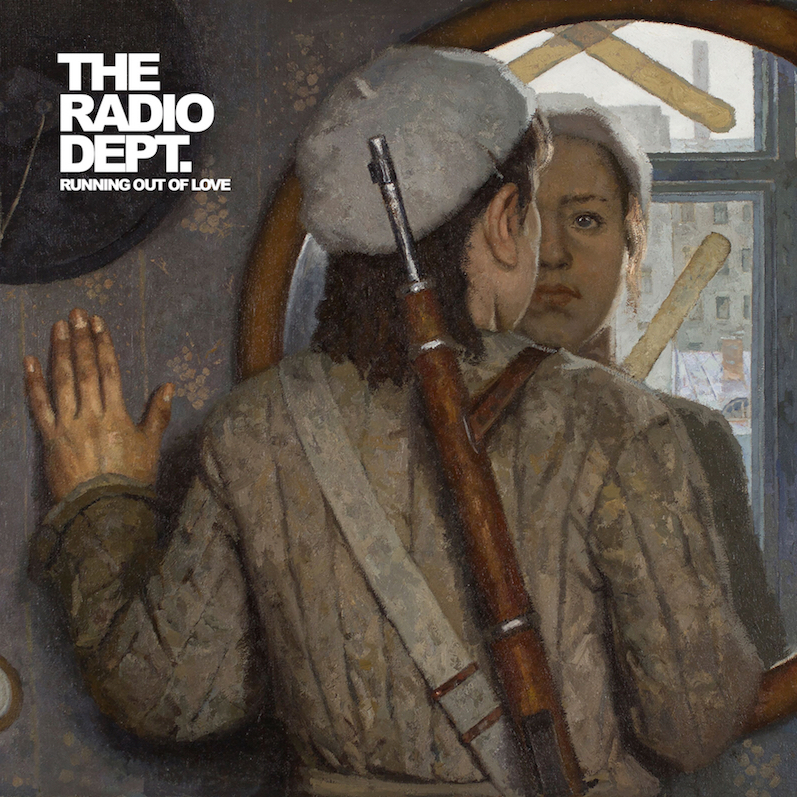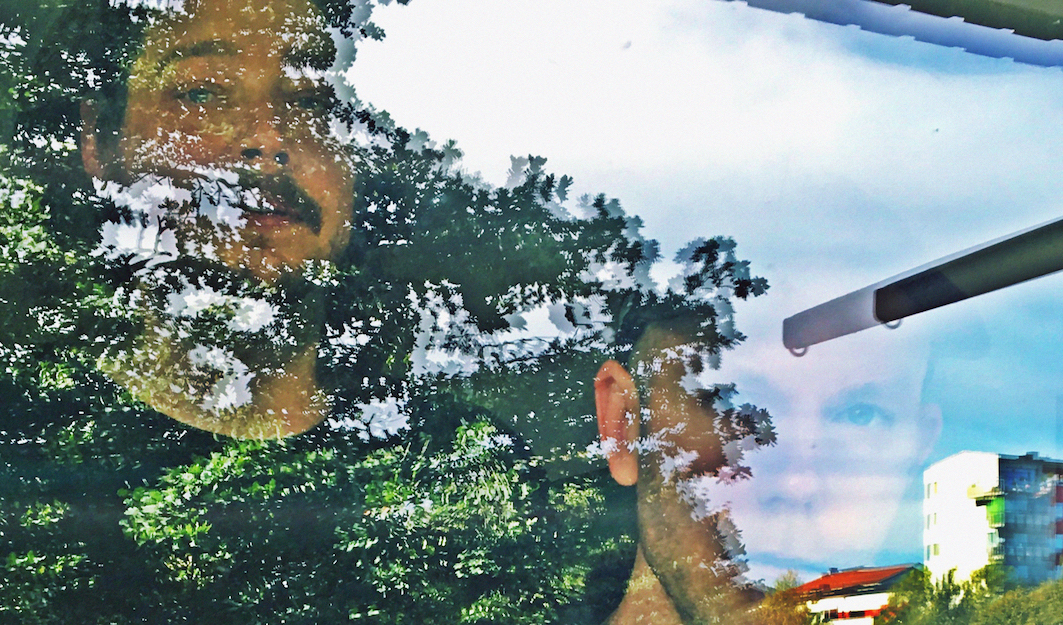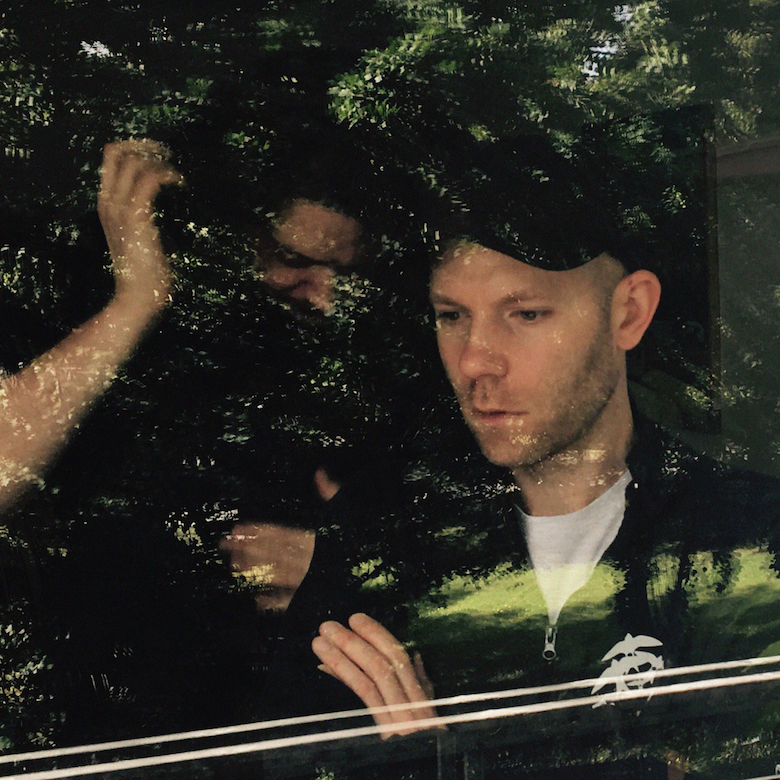Fri, 01/20/2017 - 08:39 by karyn
The Radio Dept.'s Running Out of Love, recorded over a period of several years and finally released in 2016, feels disarmingly prescient. While the duo were honing in on the rise of fascism in their native Sweden, the album (unfortunately) now speaks rather accurately to the global post-Trump/Brexit panic. It’s an interesting and exciting change for the band, who were previously known more for their dreamy lo-fi production and effortless sense of melody than pointed political commentary, and the end result is the most remarkable achievement of their already exceptional career. On the verge of their North American tour, I spoke with singer Johan Duncansson about the political meaning behind lo-fi production, the influence of David Lynch and John Carpenter, and the loaded symbolism of the electric guitar.
Was there any fear or hesitation on your part about making something so overtly topical? Any pitfalls you hoped to avoid?
There's always a risk of sounding preachy and dull when you make political statements and that was a concern for a while. But when the record was done I knew I was happy with the lyrics. I tried to write about a lot of different things but somehow almost all the songs became political in one way or another. It couldn't be helped.
What do you think is the most embarrassing example of a political pop song? What, if anything, could have been done to improve it?
When you get the feeling that bands think that their listeners don't follow the news or know basic things, is probably when political lyrics get embarrassing to me. Although almost all good bands of course are very left wing, it doesn't mean that all bands that are left leaning are any good. A lot of them... aren't. Still we don't mind bad music as much as we mind capitalism, fascism and racism. It's a close call sometimes but so far we'd rather have a couple of bad records a year than a fascist state. So now is not a time to be dissing bad political lyrics, it's a time to kill fascism. And we need bad lyricists too in order to achieve this, we need everyone.
In the recording process, do you each have individual tendencies that compliment or contradict each other?
Yes, Martin has a maximalist leaning and I'm more of a minimalist. So since Pet Grief there's been an ongoing argument about how much to add to the songs in terms of layers and effects. I'm all for effects if we keep things minimal. The more things we add to a song, the less reverb, delay or whatever I'm willing to add, whereas Martin usually wants it all at once. Many layers, many effects. I'm very stubborn though, so I guess I get my way a lot of the time.
Are there specific techniques and habits you tend to rely on, or ones that you have worked to avoid?
We have this cheap little guitar amp that we put everything through. Keyboards, guitars, bass, vocals and so on all go through the amp. Production-wise that's a red thread throughout all the records we've made, no matter if it's been guitar-based songs or more electronic music. But musically we usually want to try new things. Changing is important. But sometimes I wonder if people can tell because there's always a bunch of journalists still going on about shoegaze each time we put something out. You wonder if they listen to the music at all... At the same time there's also a group of angry listeners every time who like some of our earlier records and hate the latest one. I prefer that reaction though, partly because it's fun to piss people off but also because they've noticed the difference in style. You know that they've listened once at least.
It’s interesting that you bring up the confused reactions to the new record. To me, this record sounds like a refinement of a lot of the ideas and techniques you’ve been exploring since Pet Grief. Sure, the guitars are less present in the mix and the beats hit a little harder, but that’s hardly a major deviation. The electronic elements have always been there, and the end result still sounds very much like you. But with so much new music, it seems like a large segment of listeners only give themselves permission to really engage with something if a guitar is prominent. Why do you think the guitar is such a defining and talismanic thing for so many people, more than other elements?
I don’t know but it’s a very interesting question. And it’s certainly true for a lot of people but I’ve also come across those who take the opposite approach. People who find guitars off-putting, sometimes just because of the way they sound but more often because they’re associated with older music. With parents and other elderly people. With old politics, old attitudes and old aesthetics. Identity plays a huge role in all culture so it’s not hard to understand why some people feel that way. But by now drum machines, samplers, synths and so on have been part of music making for decades. Different kinds of electronic music have been around along side guitar based pop music all my life so I don’t feel the need to choose sides when it comes to instrumentation. That kind of thinking feels old to me, it’s what you do with the instruments that’s important. I just want something, anything, that makes a sound and I’m ready to go.
How has your relationship to the guitar changed over time? Do you think of yourself as a guitar player, or is it just one tool among many?
It’s just a tool. I guess I am a guitar player, I mean I play guitar, but I don’t know anything about them really. I just know that I like them. And I really like the sound of cheap guitars which is convenient when you don’t have a lot of money.
One of the things that I’ve always loved about your records is the way you seem to foreground the technology involved in their creation. The music sounds very overtly like it was made in a home studio, by people working with computers. It reminds me of Beat Happening, or the lo-fi sampling on the early Public Enemy and Wu Tang Clan records. Within the context of the music, the sonic qualities of those records can be read as political - a sort of populist statement about making means of production clear and accessible. What do sound quality and home recording mean to you? Do you consider it a statement, or just the method you’re most comfortable with?
Thanks for noticing! It's both. This is very important to us. We've always liked music that sounds raw and simple and that communicates pretty much exactly what you describe. Love those bands too. I don't know that it's populist though, or we'd be a more popular band, but it's certainly ideological to us. You want art to persuade you to want to do it yourself. You want it to be really good of course but to also tell you that it's not that hard. To us it's much easier to relate to music like that, music with an almost demo-like quality in a way, it sounds more human I think. And it sounds better too, cooler, and that's equally important. It's also convenient for us to record without having to think a lot about technology, it's easier and it keeps us more focused on the actual music.
I remember the first time I saw John Carpenter's Halloween when I was 13 and I thought "Hey, I could do this!" Not that I wasn't impressed or that it didn't look good, I really was and it really did, there was just something really inspiring about its grit and simplicity. And the fact that he did so many things by himself, from writing and directing to composing the music, made me feel like anything is possible. Few things would make me prouder than to be able to get that message across along with the music.
What are your relationships with the technology in your life? Beyond the hardware and software you use to record, what are your relationships with cell phones, social networks, and streaming media? Do these things influence or enter into your creative process?
Privately we're like most people when it comes to modern gadgets I guess but it doesn't really affect how we make music. As for social networks, we don't want to communicate too much outside of the records. We'll tell people if there's a new song coming out or if we're doing a show somewhere but that's pretty much it. I'm sure that a lot of people want bands to be accessible and to constantly entertain in various non musical ways, and that's fine, but they'll have to look elsewhere. We're not their band.
On “A Token of Gratitude” from Clinging to a Scheme, you quoted the lines “Do I love you?/Yes, I love you/But easy come, easy go” from the Blue Nile’s “Tinseltown in the Rain.” What’s the the relationship of that song and band to your work?
I love that album. We like to leave clues in songs sometimes to things that inspire us. Little things that observant listeners will find. When I wrote "A Token of Gratitude" I'd gotten a letter in the mail from someone containing two joints and a note that said, "Please accept these as a thank you for the music. Lovely vocals. Stay anti. I love you. Looking forward to more, don't let me down now!" A real fan letter, one of very few. I got the idea to try to rewrite it as a lyric and those lines from "Tinseltown in the Rain" came to mind and fit perfectly. I hoped people that picked up on it would get that it was meant as an homage. To me "A Token..." could be about a relationship between two people or it could be like a fan letter from me, or us, to anyone who ever inspires us, like Blue Nile for instance.
On the subject of leaving clues in songs - the main synth riff in “Occupied” is (at least to my ears) an overt nod to “Laura Palmer’s Theme” from Twin Peaks. The lyrical content, on the other hand, is very clearly about your past legal issues with Labrador Records. Was there a deliberate connection being made between the surreal dream logic of Twin Peaks and the frustrating reality of suing your record label?
Not really. On the first version of ”Occupied” I used a very different keyboard sound and didn’t think of Twin Peaks at all. Then we borrowed a toy keyboard from a friend and tried playing the chords with various sounds and came across this Twin Peaks-y pad that really suited the song. The chords are similar to "Laura Palmer’s Theme” too but I hadn’t thought of that until they were played with that keyboard sound. So that reference wasn’t deliberate from the start, it just happened and we liked it and kept it that way. But we did think a lot about changing it, because a Twin Peaks reference is kind of pointless. We love the TV series of course, I’ll go as far as to say it changed my life, but everyone already knows it. Nobody in the world will find Twin Peaks because of us.
And finally, who had the better set of Swedish guns, Dolph Lundgren or Marcus Schenkenberg?
I've never seen them naked so I'm afraid I can't help you there.
Canadian Tour Dates:
February 28th, 2017 - Vancouver - Biltmore Cabaret
March 5th, 2017 - Toronto - The Mod Club
March 6th, 2017 - Montreal - Théâtre Fairmount
Gallery photos: Mia Kerchinsky








Add comment